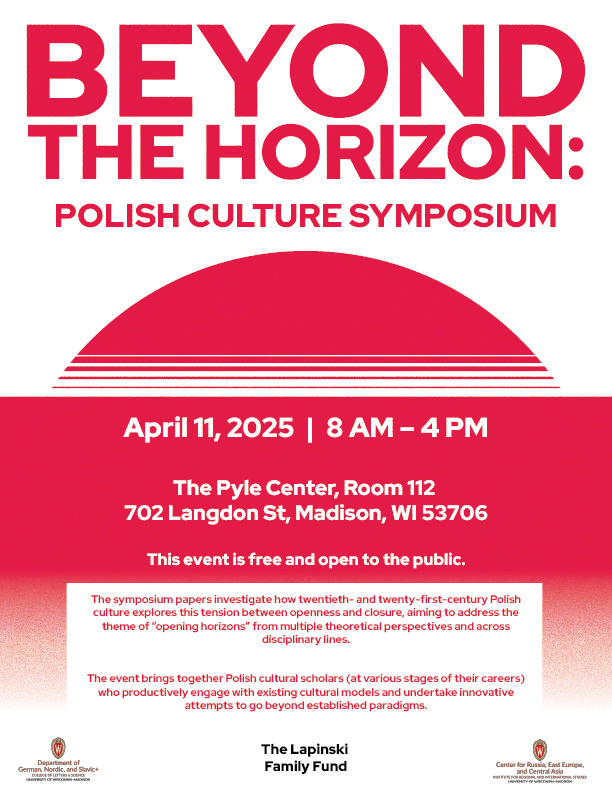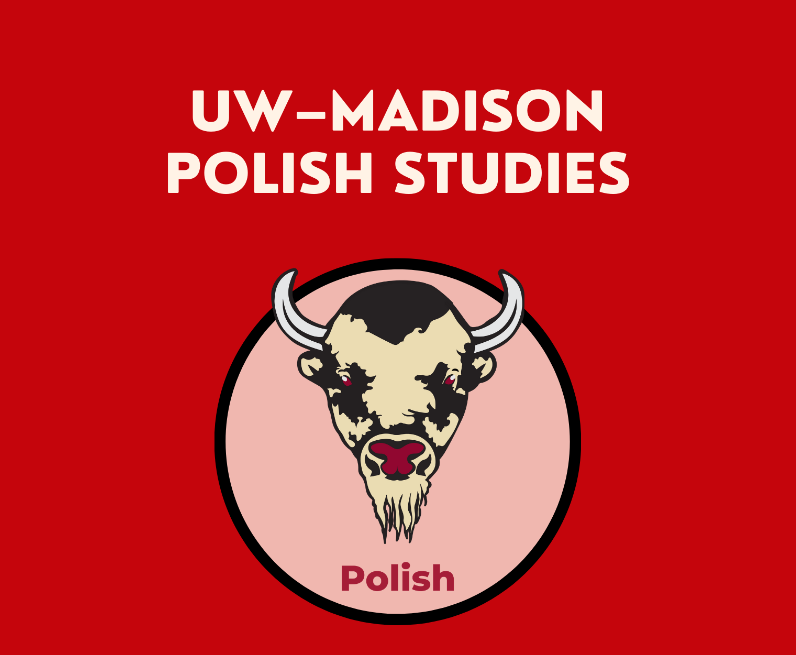Following the 2025 Wisconsin Slavic Conference, the University of Wisconsin–Madison campus hosted another major Slavic event: a symposium on Polish literature and culture under the theme Beyond the Horizon. The symposium brought together Polish cultural scholars from across the United States and Canada—at various stages of their careers—who both engaged with established cultural models and offered innovative approaches that push beyond conventional paradigms.

This first-of-its-kind initiative of the UW Polish Studies program explored how twentieth- and twenty-first-century Polish culture has navigated the tension between openness and closure. Centered on the theme of “opening horizons,” the symposium brought together scholars from major North American universities, who approached the topic through diverse theoretical lenses and across disciplinary boundaries.
The symposium featured four thematically arranged panels: two focused on Polish-language literature and the other two on Polish cinema and television. Presenters examined a wide range of Polish cultural texts spanning various historical periods—from the interwar years (such as Stefan Żeromski’s 1924 novel The Coming Spring [Pol. Przedwiośnie] and Juliusz Gardan’s 1933 drama Life Sentence [Pol. Wyrok życia]), through the communist era (including Jerzy Kawalerowicz’s 1971 film Maddalena and portrayals of the People’s Republic of Poland in contemporary television and film), to twenty-first-century works by Nobel Prize winner Olga Tokarczuk, acclaimed theatre director Krzysztof Warlikowski, and Netflix’s TV series Infamy [Pol. Infamia], among others.
The symposium included panels on languages of Polish literature; motivations and voices in Polish literature and theatre; screening in-betweenness in Polish film and television; and new approaches to Polish cinema. Among the presenters were three members of the UW–Madison Slavic unit: Łukasz Wodzyński (Assistant Professor of Polish), Krzysztof E. Borowski (Lecturer), and Piotr Kawulok (Ph.D. Candidate) who presented their research to fellow UW faculty members, graduate students, and members of the wider Madison community.
Following the conclusion of the panel discussions, Łukasz Wodzyński, the symposium convener, thanked all presenters and expressed hope for organizing additional Polish symposia in the near future. The 2025 symposium was made possible through the financial support of the Lapinski Family Fund, as well as the assistance of the Department of German, Nordic, and Slavic+ and the Center for Russia, East Europe, and Central Asia.
Beyond the Horizon: Polish Culture Symposium 2025 full program
Panel 1: Languages of Polish Literature
Krzysztof E. Borowski (UW–Madison), “Beyond the Monolingual Horizon: Multilingual Poetics and the Reimagining of Cultural Identity in Szczepan Twardoch’s Works”
Piotr Florczyk (University of Washington), “‘A Pole is a pole is a pole’: Reading and Translating Polish Literature in America”
Panel 2: Affects, Impulses, and Voices in Modern Polish Literature and Theater
Kasia Bartoszyńska (Ithaca College), “Collective Narration and the 4th Person Voice: Olga Tokarczuk’s Historical Fictions”
Tamara Trojanowska (University of Toronto), “Warlikowski’s (A)pollonia: Genesis, Camp, and Affect”
Piotr Kawulok (UW–Madison), “Like that Greek Prophetess’: Stefan Żeromski’s The Coming Spring as a Meta-Utopian Novel”
Panel 3: In-Betweenness on Screen
Joanna Niżyńska (Indiana University), “Music and In-Between-Identities in the Netflix Infamy”
Łukasz Wodzyński (UW–Madison), “PRL Noir: Specters of Communism in Contemporary Polish Crime Film and TV”
Łukasz Siciński (Indiana University), “Reality, Appearance, and Moral Agency: A Philosophical Reading of Jerzy Kawalerowicz’s Films”
Panel 4: Looking Awry at Polish Cinema
Beth Holmgren (Duke University), “Piecing Together Wyrok życia: Linking Film Analysis with Production History”
Helena Goscilo (Harmony Fund), “Where Tokarczuk and Szumowska Meet: The Literary Hermaphrodite and the Screen Transsexual”
Support Polish Studies at the University of Wisconsin–Madison
To support the teaching and study of Polish language, literature, and culture at UW–Madison through similar initiatives, see this page for more information: gns.wisc.edu/donate or contact Prof. Łukasz Wodzyński directly at lukasz.wodzynski@wisc.edu.
* * *
Read also:
Announcing 2025-2026 Polish Language, Literature, and Culture Awards at UW–Madison
UW–Madison Polish Faculty Elected to North American Association of Teachers of Polish Board
Professor Łukasz Wodzyński Receives Best Article in the Slavic and East European Journal Award
* * *
UW–Madison Polish Studies Program
Educating the Wisconsin public about the Polish language, literature, and culture since 1936.
The University of Wisconsin–Madison Polish Studies Program is the oldest academic program in the United States focused on the study and teaching of the Polish language, literature, and culture. UW–Madison Polish studies offer a comprehensive package of Polish language, literature, and culture courses, a generous scholarship program designed exclusively for its students, and various extracurricular activities each academic year.
The program, dating back to 1935, offers beginning, intermediate, and advanced Polish language courses, in addition to intensive Polish courses for heritage speakers and (under)graduate students. In 2011, the program received the prestigious Polonicum Award Distinction from the University of Warsaw for its achievements in promoting the Polish language and knowledge about Polish culture and history. The UW–Madison Polish program also offers a broad range of Polish culture courses on Polish film, contemporary Polish culture, Polish migration to the Americas, a survey of Polish culture from the Middle Ages to modern times, Polish comedy culture, and post-communism.
Each year, the UW Polish program awards scholarships for tuition through the Lapinski fund to undergraduate and graduate students studying the Polish language, literature, and culture. The Polish Student Association (PSA) provides a space for all students interested in events, activities, and learning about Poland and Polish culture. In collaboration with the Polish program faculty, the PSA also co-organizes the Madison Polish Film Festival, an annual celebration of Polish cinematography in Madison, Wisconsin, now in its fourth decade of existence.
